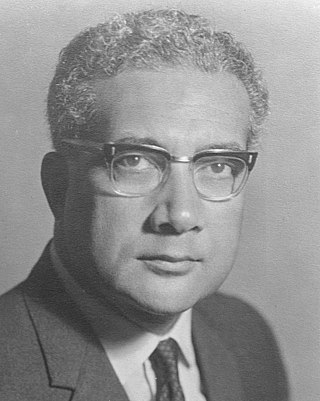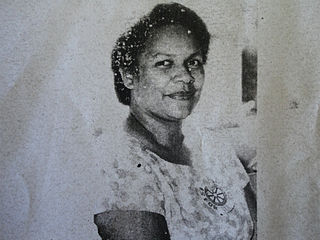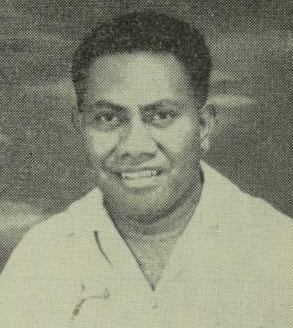
RatuSir Kamisese Mara,was a Fijian politician,who served as Chief Minister from 1967 to 1970,when Fiji gained its independence from the United Kingdom,and,apart from one brief interruption in 1987,the first Prime Minister from 1970 to 1992. He subsequently served as president from 1993 to 2000.

Articles about people,places,things,and concepts related to or originating from Fiji,include:

RatuSir George Kadavulevu Cakobau was a Fijian statesman and athlete. A great-grandson of Ratu Seru Epenisa Cakobau,the paramont chief of Bau who had unified all the tribes of Fiji under his reign in the mid-1800s,Ratu Sir George held the traditional titles of Vunivalu of Bau and Tui Levuka and thus was considered by many as Fiji's highest-ranking traditional chief. Ratu Cakobau was appointed Governor-General of Fiji in 1973,becoming the first indigenous Fijian to serve as the viceregal representative of Elizabeth II,Queen of Fiji.
The House of Chiefs in Fiji consists of the Fijian nobility,composed of about seventy chiefs of various ranks,majority of which are related. It is not a formal political body and is not the same as the former Great Council of Chiefs,which was a political body with a prescribed constitutional role,although the membership of the two bodies did overlap to a great extent.

RatuNaiqama Tawake Lalabalavu MBE is a Fijian Paramount Chief and the current speaker of the parliament. He had served as the leader of the opposition.
Sir Vijay Raghubar Singh,KBE was an Indo-Fijian lawyer and politician who held Cabinet office in the 1960s and 1970s. Vijay Singh served in Prime Minister Ratu Sir Kamisese Mara's government in a variety of positions,including Attorney-General,and was president of the Indian Alliance,a division of the ruling Alliance Party. He quit the party in 1979 following disagreement with Alliance leadership and later joined the opposition National Federation Party. Vijay Singh was involved in the restructure of the Fiji sugar industry and was a leading member of the Jaycees movement in Fiji.

Ambalal Dahyabhai Patel, better known as A.D. Patel,was an Indo-Fijian politician,farmers' leader and founder and leader of the National Federation Party. Patel was uncompromisingly committed to a vision of an independent Fiji,with full racial integration. He was one of the first to advocate a republic,an ideal not realized in his lifetime. He also advocated a common voters' roll and opposed the communal franchise that characterized Fijian politics.
Tui Nadi is the title of the Paramount Chief of Nadi,in Fiji. The Tui Nadi hails from the village of Narewa,and exercises chiefly authority over the subdistricts of Nadi and Sikituru.
Ayodhya Prasad Sharma was an Indo-Fijian farmers' leader and politician. He formed the most successful farmers' union in Fiji and forced the Colonial Sugar Refining Company to make concessions to farmers after 60 years of total control over Fiji's economy. However,other Indo-Fijian leaders formed rival unions and his initial success was not repeated. He also served as a member of the Legislative Council between 1953 and 1959.

Western United Front (WUF) was an ethnically Fijian political party formed prior to the 1982 elections and contested the election in coalition with the National Federation Party . The party was in response to the disenfranchisement of indigenous peoples in the Western Provinces of Viti Levu as despite the presence pf major economic drivers of the country located in their areas they lack representation on the decision making table of the country.
The Federation Party was Fiji's first formal political party. The Citizens Federation,which had won three of the four seats reserved for Indo-Fijians at the 1963 elections,decided to formalize its role as a political party,which was officially founded on 21 June 1964 with A. D. Patel as President and Sidiq Koya as Vice-President. The merger took place in time for the party to participate in the 1965 constitutional conference which was called to map out a path towards independence from the United Kingdom. In 1968,the Federation Party merged with the National Democratic Party to form the National Federation Party,which is now (2021) the oldest political party in Fiji still in existence.
This is a synopsis of organisations formed by Indians in Fiji. When they became free from the bondage of indenture and were able to organise themselves,they founded numerous organizations to seek social and political justice. These organisations promoted the teaching of Indian languages and religious practices and also to help others in time of need. Some of the successful organisations are listed below in the order in which they were established. Some,such as the National Federation Party,are no longer exclusively Indian,but are still predominantly so.

AdiLosalini Raravuya Dovi was a Fijian politician and lady of rank in Fiji's chiefly leadership. In 1966 she was jointly one of the first women elected to parliament,serving in the House of Representatives until 1977. She also served as Assistant Minister for Urban Development and Social Welfare from 1975 to 1977.
RatuLuke Dawai was a Fijian chief,administrator and rugby union international.
Ratu Apakuki Tuisue Nanovo was a Fijian chief and politician. He served as a member of the Senate between 1970 and 1977.
RatuTiale Wimbledon Thomas Vuiyasawa was a Fijian chief,civil servant and politician. He served as a member of the Legislative Council and Senate.
RatuMarika Vukinamualevu Ratoto Latianara was a Fijian chief and Senator.
RatuSirJone Latianara Kikau was a Fijian chief,civil servant and politician. He served as a member of the Senate from 1973 to 1979.

RatuMeli Loki was a Fijian chief,businessman and politician. A pioneer in the indigenous Fijian tourism industry,he served as a member of the Senate between 1979 and 1982.








